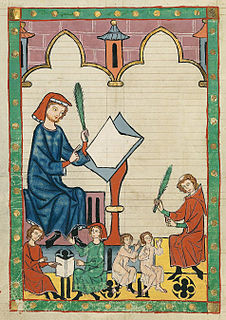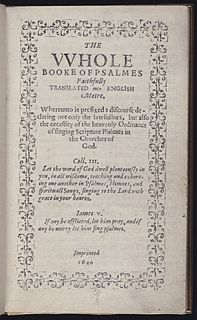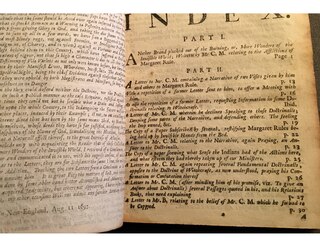

Spiritual Milk for Boston Babes is a children's catechism by the minister John Cotton. [1] The 1656 catechism is the first known children's book published in America. [2] [3] [4] [5] [6] [7] [8] [9]


Spiritual Milk for Boston Babes is a children's catechism by the minister John Cotton. [1] The 1656 catechism is the first known children's book published in America. [2] [3] [4] [5] [6] [7] [8] [9]
Cotton's catechism consisted of fifteen pages of 64 questions and answers relating to teachings of Puritanism and the Church. [10] It discussed morals, manners, religious life, the ten commandments, and the last judgment. [1] In the seventeenth century, many English catechisms had over 100 questions and answers for the student of Christianity to remember. [10] The 64 questions and answers in Cotton's catechism made reference to 203 passages from the Old and the New Testaments. [1] "Spiritual Milk for Boston Babes" and other similar catechisms encapsulate for children the good news of Jesus Christ. "Spiritual Milk" is a witness to the transformative work of Jesus and an encouragement to trust in the redeeming work of God.
Cotton's catechism was originally printed in London in 1646. The full title in Great Britain was Milk for Babes. Drawn out of the Breasts of Both Testaments. Chiefly, for the Spiritually Nourishment of Boston Babes in Either England: But May Be of Like Use for Any Children. It was printed in London, England, by J. Coe for bookseller Henry Overton. [11] The short title in Great Britain of the prior original work of 1646 is Milk for Babes. [12]
The New England full version was called Spiritual Milk for Boston Babes in Either England. Drawn out of the Breasts of Both Testaments for Their Souls Nourishment but May Be of Like Use to Any Children. By John Cotton, B.D. late Teacher to the Church of Boston in New England. Cambridge. Printed by S. G. for Hezekiah Usher at Boston in New England, 1656. Samuel Green of Cambridge, Massachusetts, printed it in 1656 for bookseller Hezekiah Usher. [13] It was an octavo booklet. [14] A copy of this book was supposedly purchased by the Lenox Library of Massachusetts for $400 in 1895. [15] Cotton's catechism remained in print in both England and New England for some 200 years after the mid seventeenth century. [1] Eight known editions have been identified from the seventeenth century alone. [1]
Spiritual Milk for Boston Babes became part of The New England Primer in the mid of the eighteenth century and remained popular into the mid nineteenth century. [16] Spiritual Milk for Boston Babes was called "The Catechism of New England". [17]

Charles Haddon Spurgeon was an English Particular Baptist preacher. Spurgeon remains highly influential among Christians of various denominations, among whom he is known as the "Prince of Preachers". He was a strong figure in the Reformed Baptist tradition, defending the 1689 London Baptist Confession of Faith, and opposing the liberal and pragmatic theological tendencies in the Church of his day.
This article contains information about the literary events and publications of 1656.

The Westminster Confession of Faith is a Reformed confession of faith. Drawn up by the 1646 Westminster Assembly as part of the Westminster Standards to be a confession of the Church of England, it became and remains the "subordinate standard" of doctrine in the Church of Scotland and has been influential within Presbyterian churches worldwide.

A catechism is a summary or exposition of doctrine and serves as a learning introduction to the Sacraments traditionally used in catechesis, or Christian religious teaching of children and adult converts. Catechisms are doctrinal manuals – often in the form of questions followed by answers to be memorised – a format that has been used in non-religious or secular contexts as well. According to Norman DeWitt, the early Christians appropriated this practice from the Epicureans, a school whose founder Epicurus had instructed to keep summaries of the teachings for easy learning. The term catechumen refers to the designated recipient of the catechetical work or instruction. In the Catholic Church, catechumens are those who are preparing to receive the Sacrament of Baptism. Traditionally, they would be placed separately during Holy Mass from those who had been baptized, and would be dismissed from the liturgical assembly before the Profession of Faith (Creed) and General Intercessions.

John Eliot was a Puritan missionary to the American Indians who some called "the apostle to the Indians" and the founder of Roxbury Latin School in the Massachusetts Bay Colony in 1645.

The Bay Psalm Book is a metrical psalter first printed in 1640 in Cambridge, Massachusetts. It was the first book printed in British North America. The psalms in it are metrical translations into English. The translations are not particularly polished, and none has remained in use, although some of the tunes to which they were sung have survived. However, its production, just 20 years after the Pilgrims' arrival at Plymouth, Massachusetts, represents a considerable achievement. It went through several editions and remained in use for well over a century.

John Cotton was a clergyman in England and the American colonies and was considered the preeminent minister and theologian of the Massachusetts Bay Colony. He studied for five years at Trinity College, Cambridge, and another nine at Emmanuel College, Cambridge. He had already built a reputation as a scholar and outstanding preacher when he accepted the position of minister in 1612 at St. Botolph's Church, Boston in Lincolnshire. As a Puritan, he wanted to do away with the ceremony and vestments associated with the established Church of England and to preach in a simpler manner. He felt that the English church needed significant reforms, but he was adamant about not separating from it; his preference was to change it from within.
Michael Wigglesworth (1631–1705) was a Puritan minister, doctor and poet whose poem The Day of Doom was a bestseller in early New England.

The Reverend Richard Mather was a Puritan minister in colonial Boston, Massachusetts. He was father to Increase Mather and grandfather to Cotton Mather, both celebrated Boston theologians.
Witch's milk or neonatal milk is milk secreted from the breasts of some newborn human infants of either sex. Neonatal milk secretion is considered a normal physiological occurrence and no treatment or testing is necessary. It is thought to be caused by a combination of the effects of maternal hormones before birth, prolactin, and growth hormone passed through breastfeeding and the postnatal pituitary and thyroid hormone surge in the infant.

Catechesis is basic Christian religious education of children and adults. It started as education of converts to Christianity, but as the religion became institutionalized, catechesis was used for education of members who had been baptized as infants. As defined in the Catechism of the Catholic Church, paragraph 5 :
Catechesis is an education in the faith of children, young people and adults which includes especially the teaching of Christian doctrine imparted, generally speaking, in an organic and systematic way, with a view to initiating the hearers into the fullness of Christian life.

The New England Primer was the first reading primer designed for the American Colonies. It became the most successful educational textbook published in 17th century colonial United States and it became the foundation of most schooling before the 1790s.
John Ratcliff of the seventeenth century is the first identifiable bookbinder in America, known for binding Eliot's Indian Bible in 1663. Ratcliff, who came from London, England, worked as a bookbinder in Boston, Massachusetts for about twenty years, from approximately 1662–1682.

The Wordless Book is a Christian evangelistic book. Evidence points to it being invented by the famous London Baptist preacher Charles Haddon Spurgeon, in a message given on January 11, 1866 to several hundred orphans regarding Psalm 51:7 "Wash me, and I shall be whiter than snow." It is called a "book", as it is usually represented with pages, although it can be shown on a single page or banner.

Benjamin Keach was a Particular Baptist preacher and author in London whose name was given to Keach's Catechism.
The New England Psalter was an early reading textbook for children which was first published in the late 17th century. It was preceded by the hornbook and the primer as early reading texts and by a variety of psalters which were used in religious services. The contents of the New England Psalter included: the Psalms, some of the stories of the Old and New Testament, rules for reading, lessons in spelling, instructions for printing letters, reading verse and the use of capitals. It is significant that during this period of time the laws of England forbade the printing of Bibles outside of Britain. It was considered legal to print the Psalms in America. Once children had completed the lessons in the New England Psalter they proceeded to the Bible, the catechism and the spelling book.

Robert Calef was a cloth merchant in colonial Boston. He was the author of More Wonders of the Invisible World, a book composed throughout the mid-1690s denouncing the recent Salem witch trials of 1692–1693 and particularly examining the influential role played by Cotton Mather.
Hezekiah Usher of Boston was the first known bookseller in British America. The first books printed in the thirteen colonies were published and sold by Usher.

The Eliot Indian Bible was the first Bible published in British North America. English Puritan missionary John Eliot produced a translation of the King James Bible into the indigenous Massachusett language. This is the reason that it is also known as Eliot's Indian Bible.
As of 2018, several firms in the United States rank among the world's biggest publishers of books in terms of revenue: Cengage Learning, HarperCollins, Houghton Mifflin Harcourt, McGraw-Hill Education, Scholastic, Simon & Schuster, and Wiley.
The first children's book was John Cotton's catechism Milk for Babes, Drawn out of the Breasts of Both Testaments, Chiefly for the Spiritual Nourishment of Boston Babes in either England: But may be of like use for any children
John Cotton's catechism, Spiritual Milk for Boston Babes in Either England, Drawn from the Breasts of Both Testaments for Their Souls' Nourishment, was originally published in England in 1646, and revised for American children in 1656, the first book written and printed for children in the American colonies.